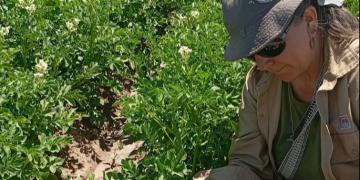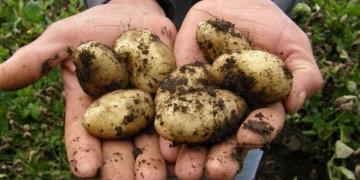España: Algae-based fertilizers are helping us tackle downy mildew in organic potato crops
In 2023, according to data from the Spanish Ministry of Agriculture (MAPA), Galicia was the Spanish autonomous region with the highest number of hectares devoted to potato cultivation, with 17,770;

a figure close to, and even higher than, the 16,934 hectares recorded in Castile-Leon. Óscar Riveiro, who is exclusively devoted to organic production, is one of the growers cultivating them.
"I started growing organic potatoes in 2008, with only half a hectare, and little by little I expanded the acreage with new farms, converting them to organic, up to the current 13 certified organic farms", he says.
"I produce the Kennebec, which is traditionally grown in Galicia and is also the most sought-after potato variety in the local market, and I also grow the Agria for other markets. This year’s sowing was delayed by between a month and a month and a half compared to a normal season because of the spring rains, as that is the time when the seeds are planted, but in general, this has been a fairly good season because the weather has been good. However, the heat and humidity in the last few days could still cause some outbreaks of mildew, which is one of the diseases causing us growers the most trouble."
"In organic farming, we have access to fewer products to deal with diseases, but with the use of copper and algae-based foliar fertilizers, we aim to keep the plants strong so that the impact of mildew will be kept to a minimum," says Óscar, who is taking part in the Algaterra project, whose aim is to produce new agricultural inputs for organic and conventional farming with discarded seaweed from the food industry. "Also, in order to minimize the presence of the disease, I try to sow on farms that are well aerated, so that the plants will grow with as little humidity as possible. Here in Galicia we don’t need to use irrigation because we are lucky enough to have frequent rainfall, although this also means we have to keep an eye on mildew."
"This year, the situation is not as bad as in other seasons, such as two years ago, when because of mildew I only harvested around 8,000 kilos from 2 hectares of crops, where I had planted around 4,000 kilos of seeds," he says. "To give you an idea of what this means, although yields in organic farming are lower than the average 25-30 tons per hectare obtained with conventional crops in Galicia, in normal conditions they should be reaching 18,000-20,000 kilos per hectare."
Downy mildew is one of the main concerns for Galician potato growers, who have also needed to learn to coexist with the EU quarantine organism Tecia solanivora povolny, or Guatemalan potato moth, since August 2015. There are currently five distinct outbreaks of the pest in Galicia, in the provinces of Lugo and A Coruña, where it is being tackled in the framework of the eradication and control program. "Since its detection, growers have been forced to adapt their warehouses by setting up systems to prevent the moth from entering or leaving, and plant health controls must also be carried out to confirm that we do not have the pest. Despite this, the moth has still managed to reach several municipalities."
"In the Lugo area, in fact, there was another producer who was growing quite a lot of organic potatoes, but about 8-9 years ago, the Guatemalan potato moth was detected in his area and potato planting was banned," says Óscar. "Many producers are still growing potatoes and have organic gardens where they cultivate a bit of everything. Riveiro Ecológicos is possibly one of the largest producers of organic potatoes in the area."
For more information:
Riveiro Ecológicos
Xesto Outeiro 23
27256 Castro del Rei, Lugo, Spain
Tel.: +34 687108778
Fuente: https://www.freshplaza.com/north-america/article/9646082/algae-based-fertilizers-are-helping-us-tackle-downy-mildew-in-organic-potato-crops/




